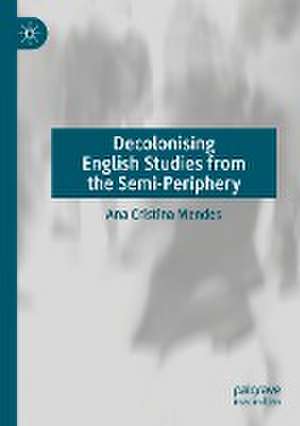Decolonising English Studies from the Semi-Periphery
Autor Ana Cristina Mendesen Limba Engleză Paperback – 3 ian 2024
| Toate formatele și edițiile | Preț | Express |
|---|---|---|
| Paperback (1) | 723.56 lei 6-8 săpt. | |
| Springer International Publishing – 3 ian 2024 | 723.56 lei 6-8 săpt. | |
| Hardback (1) | 728.74 lei 6-8 săpt. | |
| Springer International Publishing – 2 ian 2023 | 728.74 lei 6-8 săpt. |
Preț: 723.56 lei
Preț vechi: 882.39 lei
-18% Nou
Puncte Express: 1085
Preț estimativ în valută:
138.47€ • 143.47$ • 115.56£
138.47€ • 143.47$ • 115.56£
Carte tipărită la comandă
Livrare economică 21 martie-04 aprilie
Preluare comenzi: 021 569.72.76
Specificații
ISBN-13: 9783031202889
ISBN-10: 3031202880
Ilustrații: XIII, 255 p. 8 illus. in color.
Dimensiuni: 148 x 210 mm
Greutate: 0.33 kg
Ediția:1st ed. 2023
Editura: Springer International Publishing
Colecția Palgrave Macmillan
Locul publicării:Cham, Switzerland
ISBN-10: 3031202880
Ilustrații: XIII, 255 p. 8 illus. in color.
Dimensiuni: 148 x 210 mm
Greutate: 0.33 kg
Ediția:1st ed. 2023
Editura: Springer International Publishing
Colecția Palgrave Macmillan
Locul publicării:Cham, Switzerland
Cuprins
Introduction.- PART I. What Decolonisation Is and Why English Studies Needs It.- Decolonising the University: A Turn, Shift, or Fix? .- Excavating the Imperial History of English Studies .- Interrupting How the Literary Canon is Taught.- PART II. What A Decolonised Curriculum For English Studies Can Look Like .- Beyond Stasis: Intertextuality, Spreadability, and Fandom.- Adaptation Case Studies: Wuthering Heights and Home Fire.- Course Descriptions: English Literature (eighteenth and nineteenth centuries) and English Literature (twentieth and twenty-first centuries).- Concluding Notes.
Notă biografică
Ana Cristina Mendes is Associate Professor of English Studies at the School of Arts and Humanities, University of Lisbon, Portugal, where she teaches courses in cultural studies, visual culture and adaptation, and English history and culture. She is the author of Salman Rushdie in the Cultural Marketplace (2013) and The Past on Display (2013), and editor of Salman Rushdie and Visual Culture (2012).
Textul de pe ultima copertă
This book investigates how decolonising the curriculum might work in English studies — one of the fields that bears the most robust traces of its imperial and colonial roots — from the perspective of the semi-periphery of the academic world- system. It takes the University of Lisbon as a point of departure to explore broader questions of how the field can be rethought from within, through Anglophone (post)coloniality and an institutional location in a department of English, while also considering forces from without, as the arguments in this book issue from a specific, liminal positionality outside the Anglosphere. The first half of the book examines the critical practice of and the political push for decolonising the university and the curriculum, advancing existing scholarship with this focus on semi-peripheral perspectives. The second half comprises two theoretically-informed and classroom-oriented case studies of adaptation of the literary canon, a part of model syllabi that aredesigned to raise awareness of and encourage an understanding of a global, pluriversal literary history.
Ana Cristina Mendes is Associate Professor of English Studies at the School of Arts and Humanities, University of Lisbon, Portugal, where she teaches courses in cultural studies, visual culture and adaptation, and English history and culture. She is the author of Salman Rushdie in the Cultural Marketplace (2013) and The Past on Display (2013), and editor of Salman Rushdie and Visual Culture (2012).
Ana Cristina Mendes is Associate Professor of English Studies at the School of Arts and Humanities, University of Lisbon, Portugal, where she teaches courses in cultural studies, visual culture and adaptation, and English history and culture. She is the author of Salman Rushdie in the Cultural Marketplace (2013) and The Past on Display (2013), and editor of Salman Rushdie and Visual Culture (2012).
Caracteristici
Explores how English studies can be reinvented without relying on extractive colonial legacies of production and labour Offers a case study from Portugal of how decolonising the English studies curriculum can work outside the Anglosphere Advances research on semi-peripheral institutions, outside of ‘core’ countries in the academic world-system
